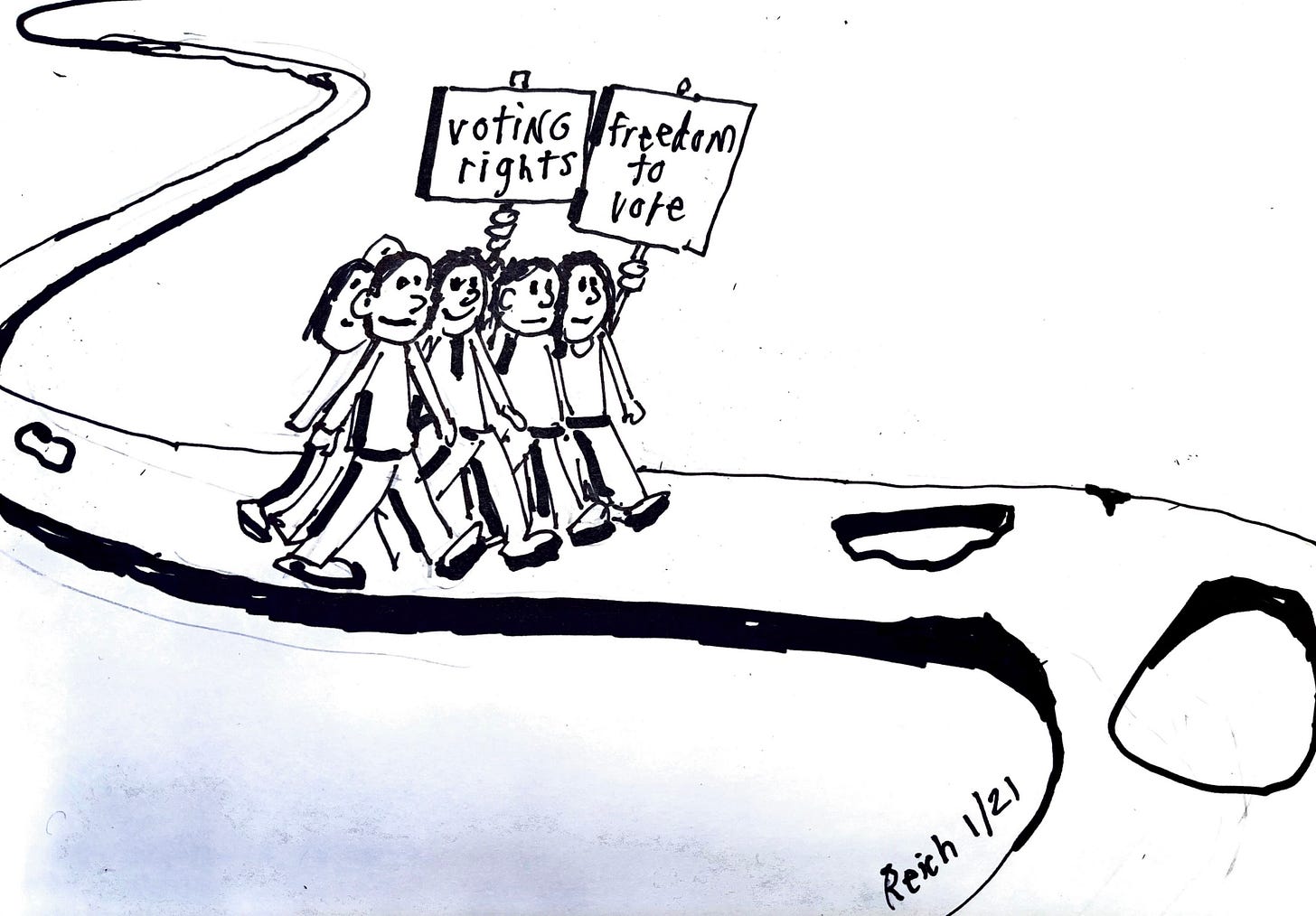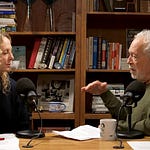I sometimes hear from people who tell me they’ve been fighting for years for the common good — for social justice, for a stronger democracy, for a sustainable environment — but they can’t do it any longer. They’re burnt out.
“I’m done,” one of my former students wrote me last week. She’s been in the trenches for more than three years at a nonprofit dedicated to environmental justice, putting in 10 to 12-hour days, often six and sometimes seven days a week. “Maybe I’ve made a small difference,” she writes, “but it’s not worth it. It’s taken a terrible a toll on me. I have to get a life.”
I understand. Regressive forces are huge and powerful. The moneyed interests have almost unlimited resources. The rightwing anti-social media have seemingly unlimited reach. Racism, xenophobia and outright lies seem to be growing louder.
In the short term — even over three or four years — positive social change can appear an impossible task. The road is very long, and it’s filled with potholes.
But almost nothing worth doing can get done in the short term. Even under the most favorable circumstances, social change never occurs quickly.
One of my dearest and oldest friends, Fred Wertheimer, has been fighting for voting rights and campaign finance reform for over forty years. When I spoke to him recently, he told me that he thought there was a good chance that senate Democrats would support the Freedom to Vote Act and the John Lewis Voting Rights Enhancement Act, and carve out a voting-rights exception to the filibuster.
I hope Fred is right, but what astonishes me about Fred is his tenacity. He keeps fighting no matter what. If senate Democrats fail, Fred will just keep fighting.
Almost thirty years ago, in the months before Bill Clinton moved into the White House, Fred asked me if Clinton was committed to reforming campaign-finance laws. I assured Fred he was, because Clinton told me so. Soon after the election, when I pressed the president-elect about it, he told me to check in with the then Democratic Speaker of the House, Tom Foley. Foley’s response? “It will never happen.”
I expected Fred to be dismayed. To the contrary, he said “Well, we have more work to do.” Fred didn’t see it as a defeat. He saw it for what it was — a clear message that those who wanted campaign finance reform had more work to do before it could become a reality.
The history of social reform — women’s suffrage, civil rights, labor rights, LBGTQ rights, and so on — confirms the central importance of tenacity.
A few years ago I spoke with Stacey Abrams, who had just lost her bid to be Georgia’s governor to Republican Brian Kemp, then Georgia’s secretary of state. Like Fred, Abrams is one of the most tenacious people I’ve ever met. She served in the Georgia legislature for ten years. She saw voter suppression first-hand. When Kemp was Georgia’s secretary of state, he oversaw the purge of hundreds of thousands of voter registrations. Yet Abram’s defeat in that election didn’t seem to faze her. She promptly turned to organizing voters. “I’m optimistic,” she said. “We’re going to win.” (Her organizing paid off in Democrats’ big wins in Georgia in 2020. Abrams recently announced she’ll be running for governor in 2022.)
How do reformers maintain their strength and commitment over so many years? Continuous activism is exhausting. Burnout is a constant hazard. What’s the secret to their tenacity? I can think of three:
First, they pace themselves. They don’t put in ten-hour days, six or seven days a week, as did my former student. Most put in normal working days. They take weekends and holidays off. They understand they’re in a marathon which they can’t possibly win if they go all out, continuously. They’re patient with themselves.
Second, they’re part of a team or group that helps one another. They trade off the hardest work among themselves so no single member of the group has to do it continuously. They buoy each other’s spirits. They share jokes and humorous anecdotes. They watch out for each other’s mental and physical health.
Third, they find opportunities to celebrate victories, no matter how small. Big victories are rare, but small ones — getting a particular city to enact a progressive measure, convincing some holdouts to join the movement, getting a favorable news story — do occur. And when they do, those who are in it for the long haul celebrate them, boosting everyone’s morale and illustrating the possibilities for larger victories.
Adam Hochschild’s brilliant and inspiring book, Bury the Chains relates the true story of twelve people (a printer, a lawyer, a clergyman, and nine others united by their hatred of slavery) who in early 1787 came together in a London printing shop and began a grass-roots movement to end the British slave trade.
It seemed impossible at the time. The slave trade was hugely profitable. The British establishment was getting rich off it. But for the next thirty years, the leaders of that movement stuck with it. Finally, in 1807, legislation was passed in both the Commons and the Lords bringing an end to Britain's involvement in the trade. The bill received royal assent in March and the trade was made illegal from May 1, 1807.
How did they do it? Not only did they pioneer a variety of techniques that have been adopted by social movements ever since (from consumer boycotts to wall posters and lapel buttons to celebrity endorsements), but they found ways to sustain themselves: They paced themselves for the long haul. They helped one another along the way. And they celebrated even small victories.











